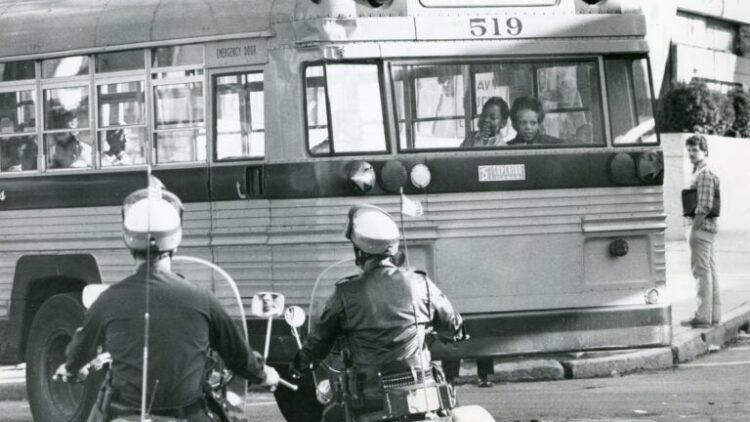As Told To
Donald Wong, a South Ender who was bused to Charlestown, shares his story of busing – fifty years since the desegregation order took effect in September 1974.
A school bus carrying only a few occupants travels along Austin Street in Charlestown on Sept. 9, 1975, during the first week of school. An initiative to desegregate Boston Public Schools was implemented in the fall of 1974 and was met with strong resistance from many residents of Boston’s neighborhoods. Joe Dennehy/Globe Staff
This story was told by Donald Wong, a South Ender who was part of Boston’s busing program, which began fifty years ago in September 1974. Wong’s story has been edited from a conversation with Annie Jonas.
I was part of the busing program that sent students from the South End neighborhood of Boston to Charlestown. I was eleven years old when I was bused from John J. Williams School in the South End to the Peter Faneuil School in Beacon Hill for fifth grade. This program involved testing fourth-graders and sending the top scorers to Beacon Hill. The class was filled with bright students from all around Boston. There was also an advanced fourth-grade class. Then for 6th and 7th grade, I was bused to the Clarence R. Edwards Middle School in Charlestown.
It was a little unnerving when you witnessed parents and children holding up signs saying “No Busing,” and “Townies Forever.” It made me think, ‘Why are you protesting? Why are the police here?’ I was bused in a van and had no issues going to school in Beacon Hill, but [in Charlestown] I felt it was dangerous to go to school.
Every morning, after getting picked up by the school bus, all the buses would meet at the Bunker Hill Community College. The buses would wait until an escort of Boston Police motorcycles escorted us to school. Busing was the first time I saw a Boston Police presence at school. I lived near the police station in the South End, so I knew they were there to protect us.
The classes were chaotic. The teachers were overwhelmed, and the classes had no discipline or order. After a hectic day, we would wait in the cafeteria until our escorts were ready to take us out of Charlestown. I was in middle school at the time. The middle school did not have as many protests as Charlestown High. Despite the chaos, the quality of the education [at the Charlestown middle school] was better than at my previous schools. The Charlestown school had home economics, woodworking, sheet metal, and, most importantly, a gym.
After the 8th grade, I had enough of public schools and headed to Don Bosco Technical High School in Chinatown. I took the entrance exam to Boston Latin School in the sixth grade but did not make it in. Looking back, this was the most traumatic failure in my young life. Being in shock from that failure and contemplating two more years of chaos in Charlestown was the deciding factor to take my future into my own hands. I took as many entrance exams as I could. I was accepted to most of the exam schools. I chose Don Bosco because the school had a technical curriculum and college prep courses.
Boston in the ’70s was a tribal city. East Boston, Charlestown, South Boston, West Roxbury, Jamaica Plain, the South End, the West End, the North End, and Roxbury were insulated and segregated. Looking back, I can empathize with Judge Garrity’s busing decision. He had the foresight to ensure economic equality by breaking down Boston’s tribal walls. For any progress to occur, the old must be destroyed.
People may question Judge Garrity’s decision, but you cannot argue against the result; Boston today is rated as one of the top cities in America.
Busing affected my life in a very positive way. I was introduced to a whole new world. I got to experience people from the North End, Charlestown, and other neighborhoods. This was cool because I learned about different cultures: Italian, Irish, Black, Jewish, and Latino. I learned how to bake cakes and cookies, make a pillow, build a shelf, participate in organized sports, field trips to Symphony Hall, and my favorite, a school-sponsored week-long trip to Tanglewood.
I would not have had those experiences without busing. Being from a poor neighborhood (the South End), I benefited from Judge Garrity’s decision.
What to read to understand Boston’s busing history
Boston.com Today
Sign up to receive the latest headlines in your inbox each morning.
Source link : http://www.bing.com/news/apiclick.aspx?ref=FexRss&aid=&tid=66e984d0a05b4da48fb78d528083d622&url=https%3A%2F%2Fwww.boston.com%2Fcommunity%2Fas-told-to%2F2024%2F09%2F17%2Fbusing-in-boston-1974-postive-affect%2F&c=6255001384510379622&mkt=en-us
Author :
Publish date : 2024-09-17 02:00:00
Copyright for syndicated content belongs to the linked Source.
